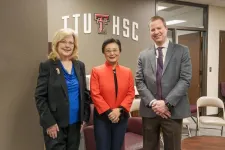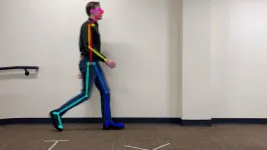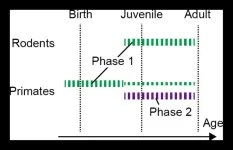The Texas Tech University Health Sciences Center (TTUHSC) School of Nursing announced March 27 the establishment of the TTUHSC Center for Nursing Research, Collaboration and Innovation.
“Interprofessional collaboration is essential for advancing research in health care,” TTUHSC School of Nursing Dean and Professor Holly Wei, Ph.D., said. “By bringing together professionals from various disciplines, we can harness a wide range of perspectives and skills to develop innovative solutions that significantly impact patient care and outcomes.”
For years, the TTUHSC School of Nursing has been recognized for its ability to educate highly competent nurses who are ready to start practicing from the moment they receive their degree. The Center for Nursing Research will bridge disciplinary boundaries and leverage various expertise to address complex health care challenges.
Alyce Ashcraft, Ph.D., R.N., the School of Nursing’s Mildred & Shirley Garrison Endowed Professor and associate dean for research and scholarship, said now is the time for the school to expand its research efforts.
“The School of Medicine has done a great job expanding their research programs,” Ashcraft said. “They have the biomedical sciences doing bench and translational research and they've received a lot of impressive grants. In the School of Nursing, we’re clinicians who practice and teach primarily. Now we’re also going to concentrate on obtaining research funding for the clinicians to conduct interventions related to health concerns so that we can impact the well-being of West Texas and beyond.”
The center, which officially opened its doors March 27, will promote TTUHSC’s and the School of Nursing’s strategic objectives and academic missions and foster interprofessional collaboration. It will do so by supporting the professional development of School of Nursing researchers and providing the infrastructure necessary for the school’s faculty and staff to write manuscripts and grants.
“Before you can get a grant, you have to write manuscripts,” Ashcraft said. “Your name has to be out there so that people know your program of research. Our faculty have been working on making themselves known since I started this job in 2012. We've been conducting research and writing manuscripts in peer-reviewed journals. The next step is to push forward with the grant writing process, and this requires resources.”
To better identify the needed resources, Lance McMahon, Ph.D., TTUHSC senior vice president for research and innovation, and TTUHSC researchers, including Ashcraft, are working on a grant called STRONG (STrengthening Research Opportunities for NIH Grants). STRONG is a type of NIH grant which would allow TTUHSC to conduct a research needs assessment encompassing all schools.
“With STRONG, we would find out what we have, what we're lacking and what we consider to be our priority needs,” Ashcraft said. “This will help us get more NIH funding.”
Ashcraft said basic bench research is not an area in which the School of Nursing’s new center will focus, at least initially. Instead, center researchers will compete for educational grants and funding for clinical research. She recently applied for a Geriatrics Workforce Enhancement Program (GWEP) grant that has the potential to provide $5 million in funding over five years.
“The GWEP grant has to do with educating clinicians, both professionals and paraprofessionals, about the care of geriatric clients,” Ashcraft said. “Typically, we don't do preclinical research; it's clinical research where we might want an NIH or NSF (National Science Foundation) grant or some of the private organizations and professional associations that give grants. HRSA (Health Resources and Services Administration) also does a lot of good educational and workforce development type grants.”
The Center for Nursing Research, Collaboration and Innovation also will manage the Ken Ketner Sabbatical Award. Several years ago, Ketner established a $1 million endowment to allow School of Nursing faculty to hone their research, clinical or teaching skills. The School of Nursing selects two faculty for the award each year, and Ashcraft said the award pays for a person to teach the recipient’s classes so the recipient can then devote time to enhancing their classroom, clinic or research skills.
By promoting faculty development, the Ketner award will help Ashcraft and the new center bolster the School of Nursing’s research presence inside and outside the TTUHSC community, especially during the next three to five years when getting the center established will be the primary goal. Because a majority of School of Nursing faculty have heavy teaching loads, Ashcraft said reliable and consistent administrative support will be important. In addition to Ashcraft, the Center for Nursing Research, Collaboration and Innovation currently includes Jason Glikas, a research administrator, and Seungman Kim, Ph.D., a statistician.
In addition to enhancing its research profile, Ashcraft said developing the new center will allow the School of Nursing to have a voice at the research table alongside the other TTUHSC schools.
“Every other school has a center for research, and now we have one,” Ashcraft said. “That's really important; we need to be on par with the other schools. We need to have a voice at the table, and we need to use it because nursing has something important to contribute. We know health and the environment in which we live and work. Researchers, physicians and nurses all play roles in determining best practices within their scope of practice.”
###
END









